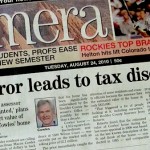The state of Boulder media: a panel discussion
Boulder Reporter | Jan 11, 2011
I was, regrettably, out of town for this event, so I was thrilled to see this reporting on it by Alan Boles in the PLAN Boulder County January 2011 Newsletter. — BW
News travels much faster and is more fragmented than ever before, people spend less time absorbing it, and fewer professional journalists are working to develop and follow it, a panel of prominent local information media figures opined at a PLAN-Boulder County forum on December 10. Kevin Kaufman, a forum panelist and the editor of the Daily Camera, declared, “The greatest competition I have is time. If I can get someone to spend twenty minutes reading the Camera, that’s great.”
 Richard Valenty, another panelist who was a political reporter and elections editor for the Colorado Daily and now serves as an aide for State Senator Rollie Heath, passed out a column by Neal Gabler called “A modern-day Gutenberg, without the helpful impact,” which Valenty said expressed some of his views about the current state of the information media. The column contended that contemporary electronic communications, such as Facebook and Twitter, are “increasingly narcissistic and trivial,” undermine rational thought, and erode “serious engagement.“ Gabler proposed what he called “Zuckerberg’s Law: Empty communications drive out significant ones.” Valenty called contemporary media the “primordial ooze.”
Richard Valenty, another panelist who was a political reporter and elections editor for the Colorado Daily and now serves as an aide for State Senator Rollie Heath, passed out a column by Neal Gabler called “A modern-day Gutenberg, without the helpful impact,” which Valenty said expressed some of his views about the current state of the information media. The column contended that contemporary electronic communications, such as Facebook and Twitter, are “increasingly narcissistic and trivial,” undermine rational thought, and erode “serious engagement.“ Gabler proposed what he called “Zuckerberg’s Law: Empty communications drive out significant ones.” Valenty called contemporary media the “primordial ooze.”
Panelist Sam Fuqua, general manager of KGNU, claimed, however, that public radio interview programs have the capacity to pull together many disparate elements of the Zeitgeist in a coherent way and generate “real conversations.” But Fuqua admitted that distracted audiences were a challenge for KGNU and acknowledged that he did not know how long people were actually listening to these programs.
Kaufman called the on-line forums at the end of articles in the electronic edition of the Daily Camera “a veritable romper room” and observed that “a lot of it is silly nonsense.” Two Boulder City Council members who attended the PLAN-Boulder forum, Suzy Ageton and Susan Osborne, commented on the impact of the blogosphere on local politics. Osborne said that, although she does not regularly read the local blogs, people would sometimes forward them to her and she frequently found those to be distressing. Ageton remarked, “One’s skin needs to get thicker if you’re going to be in the public arena, because people are nasty.”
Panelist Jefferson Dodge, the managing editor of the Boulder Weekly, said he believed that political endorsements are “still powerful.” Kaufman concurred that they continue to have an impact, but disclosed that the Daily Camera is seriously considering ending its candidate endorsements. He noted that interviews of candidates occupy a great deal of time—about 25 hours, he said, for the last local elections– and declared, “They [the candidates] don’t tell you anything.”
Kaufman noted that in 2000 the Daily Camera employed about 70 people in its newsroom, and now it employs about 40. Valenty, the former reporter, declared that he does not intend to pursue the profession of journalism any more.
Dodge welcomed the rise of “citizen journalism” and called it “great.” Valenty asserted that “citizen journalism” is most effective when it leads to a network. Fuqua, however, decried the concept of “citizen journalism.” He argued that journalism is a profession and should be practiced as a profession, not an avocation “We don’t talk about citizen accountants,” he exclaimed. “You wouldn’t want your finances handled by a citizen accountant.” Dodge commented that the closing of the journalism school at the University of Colorado seemed like “a slap in the face of the industry.”

